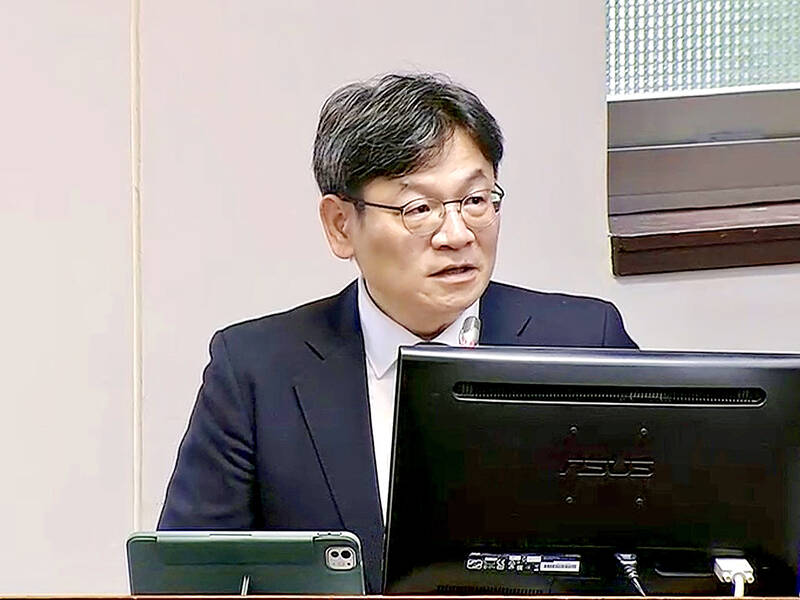Taiwan intends to build Kaohsiung into a national silicon photonics hub at a time when the country is gearing up to develop artificial intelligence, National Development Council (NDC) Minister Yeh Chun-hsien (葉俊顯) said yesterday.
The Ministry of Economic Affairs (MOEA) is discussing the establishment of a silicon photonics hub in Taiwan, Yeh said at a meeting of the legislature’s Economics Committee, adding that to his knowledge the MOEA is, in principle, interested in developing such a center in Kaohsiung.
Yeh made the comments when answering a question from Kaohsiung-elected lawmaker Lin Tai-hua (林岱樺) of the ruling Democratic Progress Party (DPP), who praised the city for its advantages in developing computing capabilities and as a good choice for a silicon photonics hub.

Photo: Wu Hsin-tien, Taipei Times
Artificial intelligence (AI) server supplier and iPhone assembler Hon Hai Precision Industry Co (鴻海精密), the world’s largest contract electronics maker, is set to build a computing center in Kaohsiung.
With silicon photonics to replace copper with optical fibers, data can be transmitted faster, with less delay and using less power during the current AI era.
With the Executive Yuan pushing for AI development, silicon photonics, quantum computing and robotics among others have been designated critical technologies, according to a council report submitted to the Legislative Yuan.
Earlier this year, the Cabinet approved a plan to establish a local Silicon Valley in southern Taiwan, which will begin at Tainan’s Shalun Smart Green Energy Science City project and extend outward to the surrounding S-shaped semiconductor cluster, linking science parks and technology industrial parks in Chiayi County, Tainan, Kaohsiung and Pingtung County.
In Kaohsiung, Taiwan Semiconductor Manufacturing Co (TSMC, 台積電) is developing the advanced 2-nanometer process, slated to begin commercial production later this year. Another 2nm process development area for TSMC is Hsinchu.
Commenting on concerns raised by ruling Chinese Nationalist Party (KMT) Legislator Hsieh Yi-fong (謝衣鳯) about the possible burst of the AI bubble, Yeh said that current AI development is different from the dot.com bubbles which finally popped without many end-users as the stock market crashed in early 2000s.
Yeh said that with enterprises rushing to set up data centers in the initial stage, AI applications are gradually trickling down from the cloud to end users, referring to smartphones and notebook computers among many others.
According to the NDC, through government efforts to promote AI development, the technology is expected to create NT$7 trillion (US$228 million) in production value and 180,000 high-paying job openings in 2028, making Taiwan the 14th largest AI developer.
In 2040, production value is expected to top NT$15 trillion with 500,000 high-paying jobs created, making Taiwan the fifth largest AI developer, the council said.

PERSISTENT RUMORS: Nvidia’s CEO said the firm is not in talks to sell AI chips to China, but he would welcome a change in US policy barring the activity Nvidia Corp CEO Jensen Huang (黃仁勳) said his company is not in discussions to sell its Blackwell artificial intelligence (AI) chips to Chinese firms, waving off speculation it is trying to engineer a return to the world’s largest semiconductor market. Huang, who arrived in Taiwan yesterday ahead of meetings with longtime partner Taiwan Semiconductor Manufacturing Co (TSMC, 台積電), took the opportunity to clarify recent comments about the US-China AI race. The Nvidia head caused a stir in an interview this week with the Financial Times, in which he was quoted as saying “China will win” the AI race. Huang yesterday said

Nissan Motor Co has agreed to sell its global headquarters in Yokohama for ¥97 billion (US$630 million) to a group sponsored by Taiwanese autoparts maker Minth Group (敏實集團), as the struggling automaker seeks to shore up its financial position. The acquisition is led by a special purchase company managed by KJR Management Ltd, a Japanese real-estate unit of private equity giant KKR & Co, people familiar with the matter said. KJR said it would act as asset manager together with Mizuho Real Estate Management Co. Nissan is undergoing a broad cost-cutting campaign by eliminating jobs and shuttering plants as it grapples

The Chinese government has issued guidance requiring new data center projects that have received any state funds to only use domestically made artificial intelligence (AI) chips, two sources familiar with the matter told Reuters. In recent weeks, Chinese regulatory authorities have ordered such data centers that are less than 30 percent complete to remove all installed foreign chips, or cancel plans to purchase them, while projects in a more advanced stage would be decided on a case-by-case basis, the sources said. The move could represent one of China’s most aggressive steps yet to eliminate foreign technology from its critical infrastructure amid a

MORE WEIGHT: The national weighting was raised in one index while holding steady in two others, while several companies rose or fell in prominence MSCI Inc, a global index provider, has raised Taiwan’s weighting in one of its major indices and left the country’s weighting unchanged in two other indices after a regular index review. In a statement released on Thursday, MSCI said it has upgraded Taiwan’s weighting in the MSCI All-Country World Index by 0.02 percentage points to 2.25 percent, while maintaining the weighting in the MSCI Emerging Markets Index, the most closely watched by foreign institutional investors, at 20.46 percent. Additionally, the index provider has left Taiwan’s weighting in the MSCI All-Country Asia ex-Japan Index unchanged at 23.15 percent. The latest index adjustments are to